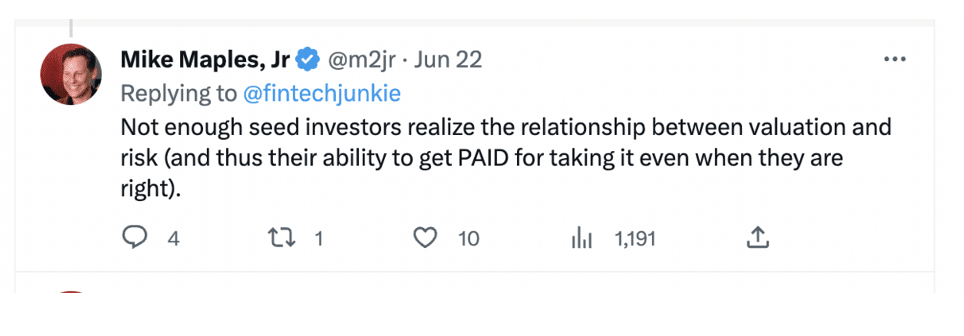
Most investors pay too much for their startup investments.
That’s a problem.
If you overpay, you’ll never make the kinds of profits that could potentially change your life.
So today, I’ll reveal one of the most important rules for startup investing:
It’s my #1 rule for ensuring that you — and I mean you — don’t overpay.
Introducing Mike Maples, Jr.
To set the stage here, let me introduce you to Mike Maples, Jr.
Maples is the co-founder of a wildly successful venture capital firm called Floodgate.
Mike has been on Forbes’ “Midas List” a whopping eight times for having a golden touch with his startup investments. His deals include mega-hits like Twitter, Clover Health, Okta, ngmoco, Bazaarvoice, and Demandforce.
Furthermore, before becoming an investor, Mike was founder of two startups that went public: Tivoli Systems (IPO TIVS, acquired by IBM) and Motive (IPO MOTV, acquired by Alcatel-Lucent).
In other words, Maples knows a thing or two about startups and startup investing.
And last week, he chimed in on Twitter about a startup-related issue that’s near and dear to my heart: overpaying for early-stage (seed-stage) startup investments.
As he wrote:
To explain what his tweet means, let me start at the beginning — with the “10x rule”…
The “10x Your Money” Rule
When Wayne and I first launched Crowdability, we conducted a deep research project.
Our goal was to identify a proven process for picking successful startup investments.
Over the course of a year or so, we sat down with more than three dozen of the most successful startup investors in the country. At the time, these investors had collectively backed more than 1,080 startups, and generated several billion dollars in profits.
And gradually, they taught us dozens of tools and “tricks” to identify winning investments.
But of all their strategies, one has been the most valuable to us by far:
How to identify the investments that can return 10x your money.
Go with the Odds
In case you didn’t know, startup investors earn their profits in two main ways:
1. The startup goes public in an Initial Public Offering (IPO); or
2. The startup gets acquired.
IPOs can lead startup investors to massive profits, but IPOs happen very infrequently.
The most common way for startup investors to earn their profits is through an acquisition — in other words, when a startup they invested in is taken over by another company.
To put the numbers in perspective: In 2020, there were about 480 IPOs. But during the same time frame, there were about 12,000 takeovers.
So, how can we spot potential takeover targets early — so we can cash out for big gains if and when they get acquired?
“Every Battle is Won Before It’s Ever Fought”
To answer this question, let me tell you about one of the investors we met during our startup research project.
Before this gentleman became a venture capitalist, he was a high-ranking military officer.
As he peppered our conversations with references to “storming the beaches of Normandy” and “the Battle of Little Round Top,” he often mentioned a particular expression:
“Every battle is won before it’s ever fought.”
As these words relate to investing, here’s what he meant:
Certain actions you take before you make an investment can determine your ultimate success. And one of the most important of these actions is this:
Filtering out investments based on their valuation.
The Importance of Valuation
Valuation is another way of saying “market cap.” It’s the total value of a company. For public companies, we say market cap. For startups, we say valuation.
And here’s the thing:
Despite what you read in the press about big-ticket takeovers — like Facebook buying WhatsApp for $19 billion — the sales price for most startups is less than $100 million.
In fact, according to PricewaterhouseCoopers and Thomson Reuters, the majority of acquisitions take place under $50 million.
So, if your goal is to earn 10x your money on a startup that might get acquired for $50 million, how do you “win this battle”?
Simple: invest at valuations of $5 million or less!
If you invest at valuations that are higher than $5 million, you might very well be overpaying for your investment!
Exceptions To Every Rule
Obviously, there are exceptions to every rule.
For example, if you have an expert to guide you, you can always consider investing in startups that are more highly valued. After all, many investors considered companies like Facebook or Airbnb “wildly overvalued” when they were worth $10 million or $100 million or $1 billion. Now they’re worth hundreds of billions.
But when you’re just getting started in early-stage investing, limiting your investments to startups that are valued at $5 million or so is a smart strategy to stick with:
This strategy will give you the greatest chances of potentially earning 10x your money.
That’s what Mike Maples’ tweet is all about:
It’s about not overpaying for your startup investments.
And that’s what we’re here to teach you about every week.
We’re looking out for you!
Happy Investing.
Best Regards,

Founder
Crowdability.com


